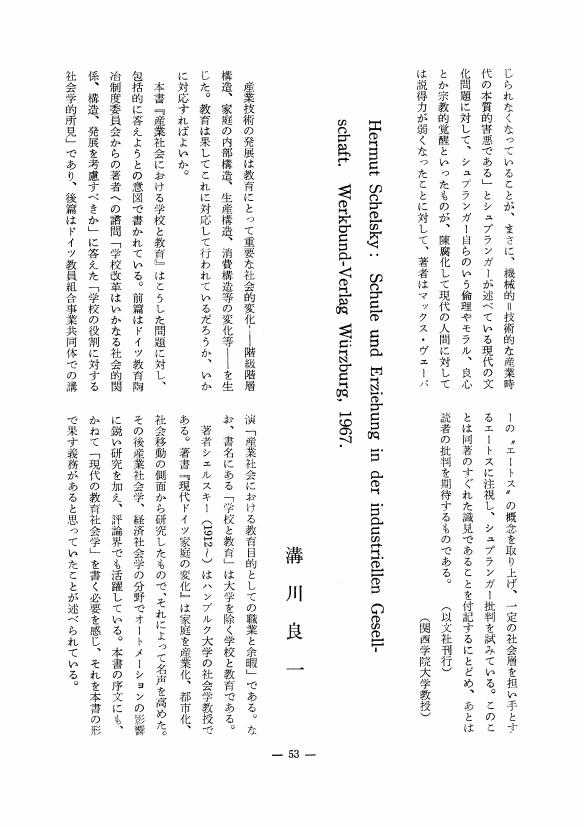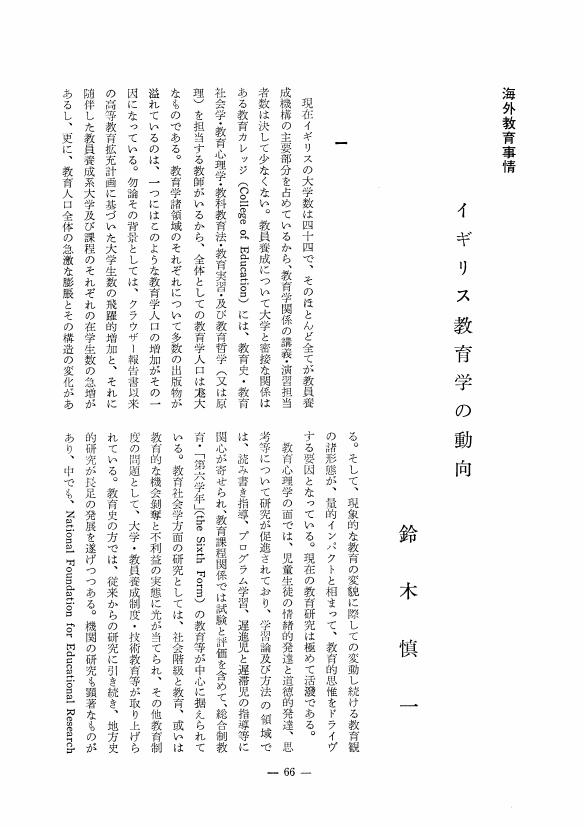1 0 0 0 OA 米国におけるモンテッソーリ・リバイバル
- 著者
- 清水 貞夫
- 出版者
- 教育哲学会
- 雑誌
- 教育哲学研究 (ISSN:03873153)
- 巻号頁・発行日
- vol.1973, no.28, pp.43-48, 1973-11-15 (Released:2009-09-04)
- 参考文献数
- 13
1 0 0 0 OA 長井和雄著『シュプランガー研究』
- 著者
- 西脇 英逸
- 出版者
- 教育哲学会
- 雑誌
- 教育哲学研究 (ISSN:03873153)
- 巻号頁・発行日
- vol.1973, no.28, pp.49-53, 1973-11-15 (Released:2009-09-04)
- 著者
- 溝川 良一
- 出版者
- The Japanese Society for the Philosophy of Education
- 雑誌
- 教育哲学研究 (ISSN:03873153)
- 巻号頁・発行日
- vol.1973, no.28, pp.53-56, 1973-11-15 (Released:2009-09-04)
1 0 0 0 OA 教育哲学の任務と課題 人間学の立場から
- 著者
- 石井 次郎
- 出版者
- 教育哲学会
- 雑誌
- 教育哲学研究 (ISSN:03873153)
- 巻号頁・発行日
- vol.1974, no.29, pp.1-5, 1974-05-15 (Released:2009-09-04)
1 0 0 0 OA ヒューマニズムの再確認
- 著者
- 高橋 憲一
- 出版者
- 教育哲学会
- 雑誌
- 教育哲学研究 (ISSN:03873153)
- 巻号頁・発行日
- vol.1973, no.27, pp.1-6, 1973-04-30 (Released:2009-09-04)
1 0 0 0 OA 世界の中の日本人 教育的 (人間生成的) 視点
- 著者
- 周郷 博
- 出版者
- 教育哲学会
- 雑誌
- 教育哲学研究 (ISSN:03873153)
- 巻号頁・発行日
- vol.1973, no.27, pp.7-14, 1973-04-30 (Released:2009-09-04)
1 0 0 0 OA “アジアの眼” でみた日本人
- 著者
- 武田 清子
- 出版者
- 教育哲学会
- 雑誌
- 教育哲学研究 (ISSN:03873153)
- 巻号頁・発行日
- vol.1973, no.27, pp.15-22, 1973-04-30 (Released:2009-09-04)
1 0 0 0 OA 戦前及び戦後における日本人
- 著者
- 稲富 栄次郎
- 出版者
- 教育哲学会
- 雑誌
- 教育哲学研究 (ISSN:03873153)
- 巻号頁・発行日
- vol.1973, no.27, pp.23-28, 1973-04-30 (Released:2009-09-04)
1 0 0 0 OA ペスタロッチーの言語批判と言語陶冶の理念
- 著者
- 広瀬 俊雄
- 出版者
- 教育哲学会
- 雑誌
- 教育哲学研究 (ISSN:03873153)
- 巻号頁・発行日
- vol.1973, no.27, pp.29-48, 1973-04-30 (Released:2010-01-22)
- 参考文献数
- 74
Though problems of Pestalozzi's language theory and his language education theory were partially touched upon in the past, they were rarely ever examined in an encompassing and systematic fashion. The purpose of this paper is to examine as one approach for analyzing Pestalozzi's language education theory as a whole this idea and in particular the meaning of the idea of education toward “expressing” and “speaking” within the context of the language criticism which he ordinarily used. The paper is arranged according to the following plan.IntroductionI. The language criticism of Pestalozzi(1) Pestalozzi's criticism of the printing press culture (2) Pestalozzi's criticism of the common schoolII. The meaning of Pestalozzi's “expression” (1) The experience of expression(2) Arriving at clear (logical, conceptual knowledge) ideas(3) Expression of thoughtThe following works were mainly used in this paper : “Wie Gertrud ihre Kinder lehrt” (1802) and “Uber den Sinn des Gehors in Hinsicht auf Menschenbildung durch Ton und Sprache” (1803-1804).
1 0 0 0 OA 教育学における研究方法論の問題 西ドイツ教育学界における近年の論義を中心に
- 著者
- 平野 正久
- 出版者
- 教育哲学会
- 雑誌
- 教育哲学研究 (ISSN:03873153)
- 巻号頁・発行日
- vol.1973, no.27, pp.49-65, 1973-04-30 (Released:2010-05-07)
- 参考文献数
- 23
1 0 0 0 OA イギリス教育学の動向
- 著者
- 鈴木 慎一
- 出版者
- 教育哲学会
- 雑誌
- 教育哲学研究 (ISSN:03873153)
- 巻号頁・発行日
- vol.1973, no.27, pp.66-70, 1973-04-30 (Released:2009-09-04)
- 参考文献数
- 1
1 0 0 0 OA ブラメルド『激動期の教育』と『教育哲学の類型』改訂版について
- 著者
- 甲斐 進一
- 出版者
- 教育哲学会
- 雑誌
- 教育哲学研究 (ISSN:03873153)
- 巻号頁・発行日
- vol.1973, no.27, pp.71-76, 1973-04-30 (Released:2009-09-04)
- 参考文献数
- 5
1 0 0 0 OA 哲学的人間学と教育的人間学との接点
- 著者
- ヴァルター ドレーアー
- 出版者
- 教育哲学会
- 雑誌
- 教育哲学研究 (ISSN:03873153)
- 巻号頁・発行日
- vol.1973, no.28, pp.1-13, 1973-11-15 (Released:2009-09-04)
- 参考文献数
- 26
今日、「人間学」という概念は好んで使われる流行概念になっている。さまざまな個別科学がこの概念を使用するのは、この概念によってどのような形で理解された人間学であれ、個別諸科学の経験的な研究成果の人間学的な解釈を求めているのだ、ということを言い現わすためである。こうして、文化人類学 (Kulturanthropologie) と並んで、生物学的=、医学的=、社会学的=、心理学的=、および神学的人間学が確立されてきたのである。教育科学の内部においても同じように、このような『内部的な固有の人間学』 (Binnenanthropologie) が作り出されたのである。つまり教育的人間学である。以下において、教育的人間学が哲学的人間学に対してどのような関係にあるかを概略的に指摘することにしたい。その際に、私たちは多少詳しく哲学的人間学に論及し、そこから教育的人間学のいくつかの問題に対する展望を得ることにしたい。
1 0 0 0 OA A・H・ニーマイヤーの「教育学」体系における「教授」の意味 特に「教育」との関係を中心に
- 著者
- 宮寺 晃夫
- 出版者
- 教育哲学会
- 雑誌
- 教育哲学研究 (ISSN:03873153)
- 巻号頁・発行日
- vol.1973, no.28, pp.14-25, 1973-11-15 (Released:2009-09-04)
- 参考文献数
- 23
The attempt is made in this paper to clarify with reference to various theories of Niemeyer, the concept of didactics in 18th century Germany concentrating on its relation to “education.” During the 18th century didactics as an educational method meant chiefly “transmission of knowledge”; Niemeyer, while folluowig this traditional interpretation, further clarifies the educational meaning of teaching. Teaching is an activity by which the understanding of the child is promoted ; it is an act, furthermore, intended to form thereby moral judgment within the child. In fact, the educational effectiveness of teachings is called into play only and always through the child's power of comprehension, i. e. indirectly. But Niemeyer discovered in this indirect effectiveness the real educational value of teaching.This interpretation of teaching forms one of the premises to Herbart's “pedagogical didactics”.
1 0 0 0 OA プラトンの善のイデア その教育的意義
- 著者
- 稲富 栄次郎
- 出版者
- 教育哲学会
- 雑誌
- 教育哲学研究 (ISSN:03873153)
- 巻号頁・発行日
- vol.1972, no.26, pp.1-13, 1972 (Released:2009-09-04)
- 参考文献数
- 9
The Idea of the Good is the highest fundamental principle in Plato's Politeia. That is to say the Politeia discusses the ideal of a state governed by the philosopher ; this philosopher is the founder of state on earth which is formed after the Idea of the Good ; he has mastered the Idea of the Good after he has learned all about it. Now what precisely is the Idea of the Good ? Because it is the highest principle of governing the world, it is difficult to grasp its true essence. Just as we cannot look immediately into the sun we cannot grasp directly such a high principle as the Idea of the Good. Therefore we can only understand it indirectly through parables. Thus the parable of the sun, the parable of the line and the parable of the cave are proposed to clarify it : this paper merely discusses these parables from the introduction till the parable of the sun. Because the Idea of the Good is the supreme principle, philosophy and political theory are completely unified under it ; its educational implication is made clear by the parable of the cave and the following elucidations.
1 0 0 0 OA 陶冶の人間的考察 シェーマ構造の陶冶的意義を求めて
- 著者
- 高橋 洸治
- 出版者
- 教育哲学会
- 雑誌
- 教育哲学研究 (ISSN:03873153)
- 巻号頁・発行日
- vol.1972, no.26, pp.14-27, 1972 (Released:2009-09-04)
- 参考文献数
- 27
Formation was traditionally conceived under the relation of nature-environment based on a biological approach, in this paper an attempt is made to re-think this relation through an anthropological approach in the setting of a subject-object relation. First of all, the reason why the classic theory of formation is losing its applicability is found in the fact that the subject-object relation from the viewpoint of human nature has become distorted. Next, in order to overcome this subjectivism it is noted that it is necessary to exchange the subject-object relation for an existential relation of being, and to see formation as the result of an answer to the demand which springs from the existential relation. Finally, the schema-structure is discussed as an internal control which makes possible a self-formation within the existential relation, and its origin and function are examined. As a result, the conclusion is reached that the formative meaning of the schema-structure consists in a personal fulfilment reached through a functionalising of the various mental activities, entering thus into an existential relation and reaching thereby a unified content.
1 0 0 0 OA 「自然」概念の教育論的省察 ロック・ルソーを手がかりとして
- 著者
- 春山 浩司
- 出版者
- 教育哲学会
- 雑誌
- 教育哲学研究 (ISSN:03873153)
- 巻号頁・発行日
- vol.1972, no.26, pp.28-43, 1972 (Released:2010-01-22)
- 参考文献数
- 50
This paper examines the meaning of “nature” in education, taking as a point of departure educational thought centered around Locke and Rousseau. In doing so, we shall draw out the two different forms of thinking concerning the awareness of nature, and then we shall examine both the postive and the negative meaning, as well as the basic characteristics of educational thought conditioned by a nature concept originating from either of these two forms of thinking. That is, the educational thought based on a scientific nature concept which, free from subjective conscience, has contributed to the intellectual liberation of man and the enlargement of self by its fundamental vein of a rational explanation of reality and the utilization of this explanation, but with the closed character of (its) conscience structure in fact, it contains a tendency to intercept the view toward a total liberation of man. On the other hand, the educational thought which draws nature into the subjective conscience and which is based on a value-reflecting normative nature concept, gave to the human being the function of criticizing the social system and has opened up the road toward complete liberation of man. It did this by perfectly subjectivising nature and adding to it a human ethos. These two concepts of nature, form the basis for characterising respecti has as its aim the formation of the “person” as such, is being visualized in contrast to a scientific knowledge (dominating knowledge) related merely to the “things” of the outside world.vely the educational theories. Among the individual theorists attention is necessarily paid to a tension or a harmony between the two. In the future it will be necessary to examine further the structure of the internal relation between these two kinds of “nature” in education.
- 著者
- 高橋 勝
- 出版者
- 教育哲学会
- 雑誌
- 教育哲学研究 (ISSN:03873153)
- 巻号頁・発行日
- vol.1972, no.26, pp.44-59, 1972 (Released:2010-05-07)
- 参考文献数
- 56
The purpose of this paper is to consider, on the basis of several works about Max Scheler's Philosophische Anthropologic and Die Soziologie des Wissens published in 1920, under what characteristics in his theory modern “knowledge” is being analyzed and how this is being interpreted in view of “formation”. In his view modern “knowledge” is characterized by the fact that that the activity of man as homo faber acquiring knowledge is technical. That is, in modern times the subject of knowledge objectivates nature and faces as the content of “knowledge” the thing (Sache) as far as it thus has been limited. This kind of “knowledge” is called scientific “dominating knowledge” (Herrschaftswissen) and has the purpose of technically dominating nature. This, however, was originally only one side of “knowledge”.In Scheler's thought “knowledge” is divided into scientific “dominating knowledge” (Herrschaftswissen), “formative knowledge” (Bildungswissen) for the formation of man and “redemptive knoweldge” (Erlosungswissen) according to whether the knowing subject, by which the process of becoming (werden) is promoted, is a “thing” (Sache), “man” (Mensch) or “the absolute” (Das Absolute), Furthermore, it is understood that neither of these three types of knowledge can be substituted for one anothei.But as long as man continues to exist as a “person” he will be a being open toward an “intentional” (meaningful) “world” (Welt). He can realize himself in this without being bound by an “environmental world” (Umwelt), which appears as a relation of “things”. It is there that a more important meaning of “dominating knowledge” which
1 0 0 0 OA 西欧諸国の歴史教育におけるヨーロッパ概念の討議
- 著者
- 山田 三雄
- 出版者
- 教育哲学会
- 雑誌
- 教育哲学研究 (ISSN:03873153)
- 巻号頁・発行日
- vol.1972, no.26, pp.60-63, 1972 (Released:2009-09-04)
- 参考文献数
- 2
- 著者
- 村田 昇
- 出版者
- The Japanese Society for the Philosophy of Education
- 雑誌
- 教育哲学研究 (ISSN:03873153)
- 巻号頁・発行日
- vol.1972, no.26, pp.64-67, 1972 (Released:2009-09-04)












